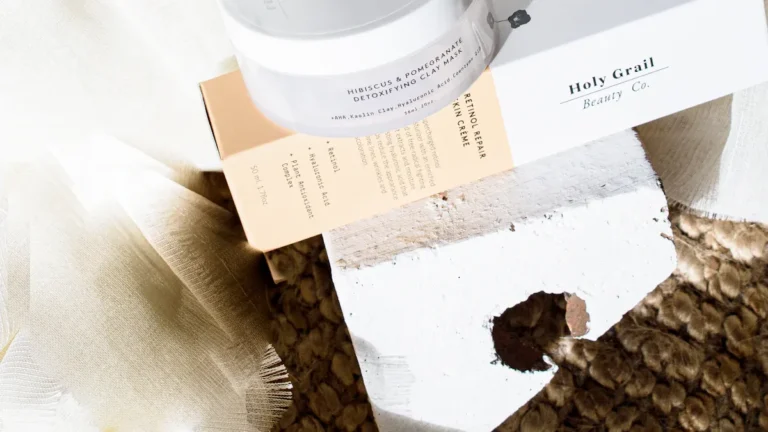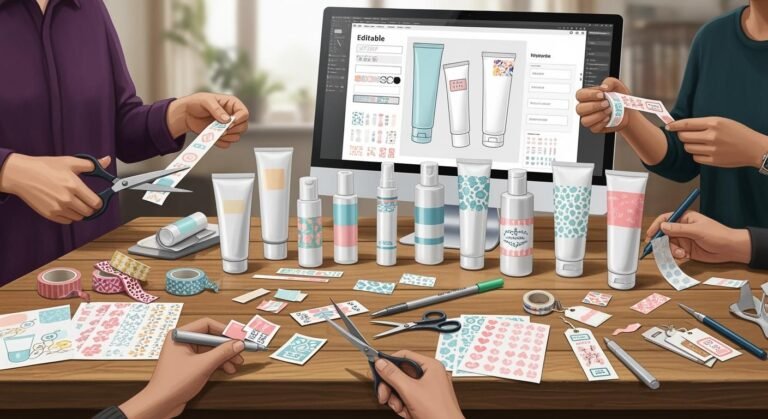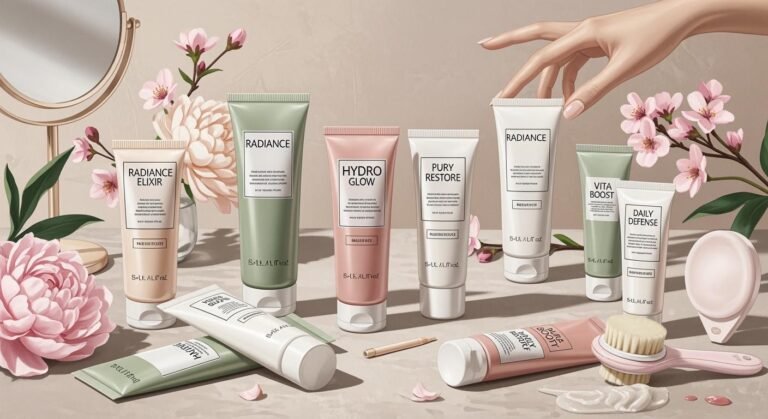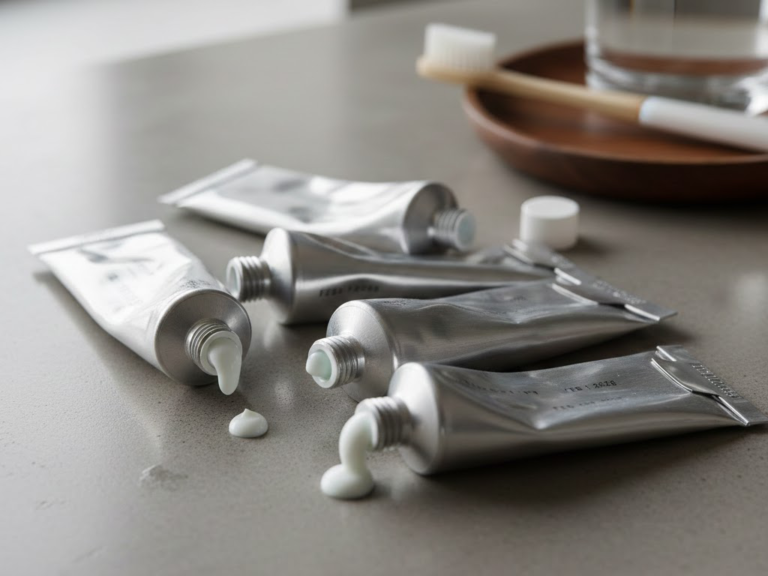Can AI Really Improve Cosmetic Tube Packaging Design for Beauty Brands?

Cosmetic tube packaging plays a pivotal role in how beauty products are perceived and sold. As beauty brands strive to stand out in a highly competitive market, packaging design has become a crucial factor in influencing consumer purchasing decisions. Today, artificial intelligence (AI) is reshaping how beauty brands approach cosmetic tube packaging design, making it smarter, more efficient, and even more innovative. But the question remains: Can AI really improve cosmetic tube packaging design for beauty brands?
In this article, we’ll dive deep into how AI is transforming cosmetic packaging design, explore key brand comparisons, provide detailed case studies, and offer valuable market insights that demonstrate how this cutting-edge technology is benefiting beauty brands worldwide.
The Power of AI in Cosmetic Tube Packaging Design
What is AI Cosmetic Tube Design?
AI cosmetic tube design involves the use of artificial intelligence to assist or fully automate the process of designing packaging for cosmetic products. With AI-powered tools, designers and manufacturers can analyze trends, predict consumer preferences, and even optimize packaging for aesthetics and functionality. The AI system can generate cosmetic tube designs, select cosmetic tube themes, and even create personalized cosmetic tube templates tailored to a brand’s vision.
How AI Can Transform the Packaging Process
AI brings a host of capabilities to the table when it comes to cosmetic packaging design:
- Trend Analysis: AI can analyze vast amounts of data from beauty industry trends, social media, and consumer preferences to design packaging that is on point with the latest market demands.
- Design Optimization: AI allows for the fine-tuning of packaging elements like shape, color, and size, ensuring the tube fits both brand aesthetics and product functionality.
- Consumer Personalization: AI-driven designs can tailor packaging to consumer preferences, creating unique, highly engaging packaging that appeals directly to specific target audiences.
- Sustainability: AI can help reduce material waste by simulating the exact amount of packaging required for each product, leading to more sustainable cosmetic tube designs.
The Role of AI in Cosmetic Tube Packaging Innovation
In an era of consumer-centric design, AI cosmetic packaging design is all about enhancing the consumer experience. Through AI, beauty brands can not only create more visually stunning packaging but also design tubes that cater to practical needs, such as ease of use, portability, and eco-friendliness.
Brand Comparisons: Who’s Leading the Charge in AI Cosmetic Tube Design?
Xinfly Packaging: A Leader in AI Cosmetic Tube Design
When it comes to AI-powered cosmetic packaging design, few companies have integrated the technology as seamlessly as Xinfly Packaging. Known for its cutting-edge approach to packaging design, Xinfly leverages AI to deliver custom cosmetic tube themes and tailored cosmetic tube templates for brands across the globe.
Xinfly Packaging uses machine learning algorithms to predict the best packaging styles based on consumer preferences and market trends. This technology helps beauty brands create personalized packaging that speaks directly to their target audience while maintaining high functionality and style.
L’Oréal: Pioneering AI for Sustainable Packaging
L’Oréal has been at the forefront of using AI in the beauty industry, not just in product development but also in packaging. The beauty giant uses AI to design packaging that reduces waste while still standing out on the shelves. L’Oréal uses data-driven insights to develop AI cosmetic tube designs that are both eco-friendly and visually compelling, allowing them to meet the growing consumer demand for sustainable beauty products.
Estée Lauder: Using AI to Optimize Packaging Designs
Estée Lauder, another leading beauty brand, has also embraced AI cosmetic packaging design. Their approach combines AI with augmented reality (AR) to create innovative, interactive packaging for skincare and makeup products. With the help of AI, Estée Lauder’s design team can test and refine cosmetic tube designs before launching them to the market, ensuring that they resonate with consumers on a deeper level.
Detailed Case Studies: AI’s Real-World Impact on Cosmetic Tube Packaging Design
Case Study 1: AI-Driven Customization for Indie Brands
Indie beauty brands have found AI to be a game-changer in creating unique and personalized cosmetic tube designs. For example, a small beauty startup in the UK used AI to design a limited-edition cosmetic tube for their best-selling moisturizer. By leveraging AI’s trend prediction capabilities, the brand was able to design a tube that not only reflected the latest consumer preferences but also incorporated elements of sustainability, appealing to the eco-conscious consumer.
The result? The product sold out within days, and the brand gained a loyal following who loved the personalized feel of the packaging.
Case Study 2: Sustainable Packaging with AI
A major global beauty brand introduced AI cosmetic tube design to meet their sustainability goals. By using AI, they were able to reduce packaging waste by 25%, as the algorithm calculated the optimal amount of material required for each product. This not only helped reduce their carbon footprint but also created a packaging line that was more cost-effective for the company.
Case Study 3: AI-Powered Market Testing for Cosmetic Tube Designs
In the competitive world of beauty, market testing is crucial to ensure packaging resonates with consumers. A beauty brand launched an AI-powered platform to test various cosmetic tube themes before production. Using AI, the brand was able to gauge consumer reactions to different designs and quickly determine which ones were most likely to drive sales. This approach helped reduce the costs associated with market research while speeding up the time to market for new products.
AI vs Traditional Design: A Comparison
Speed and Efficiency
Traditional cosmetic tube design often involves back-and-forth between designers, manufacturers, and stakeholders. This can be time-consuming and may lead to delays. AI, on the other hand, can generate cosmetic packaging design AI in a fraction of the time, allowing brands to quickly iterate and finalize packaging designs.
Cost-Effectiveness
AI tools significantly reduce the costs of the design process. With AI, brands can create cosmetic tube templates that are reusable, reducing the need for completely new designs for each product. This cuts down on both labor and material costs.
Creativity and Personalization
While traditional design still holds value for more hands-on, personalized approaches, AI allows for unparalleled customization and innovation. AI can generate a wide variety of cosmetic tube designs based on data-driven insights, resulting in more creative and targeted designs.
Market Insights: AI in the Future of Cosmetic Packaging Design
The Rise of Eco-Friendly Packaging
With sustainability becoming a major focus for beauty consumers, AI is playing a crucial role in creating eco-friendly cosmetic tube designs. Brands are increasingly relying on AI to develop packaging that minimizes waste, uses recycled materials, and is fully recyclable.
AI-Driven Personalization is Key to Future Success
As the demand for personalized beauty products increases, AI will continue to drive the personalization of cosmetic packaging design AI. Brands that use AI to cater to consumer preferences will have a significant edge in an industry where individualization is key.
The Expansion of Augmented Reality and AI Integration
Looking to the future, AI combined with augmented reality (AR) is likely to revolutionize cosmetic packaging even further. Imagine scanning a cosmetic tube with your phone to get more information about the ingredients or to access exclusive content. This type of immersive experience could become a mainstay in beauty packaging in the coming years.
Conclusion: The Future is AI-Driven Cosmetic Tube Design
As we’ve explored, AI is poised to significantly improve the way beauty brands approach cosmetic tube packaging design. From personalized packaging solutions to eco-friendly innovations, AI is making packaging smarter, more efficient, and more aligned with consumer desires. Companies like Xinfly Packaging are leading the charge in leveraging AI to create dynamic, trend-driven designs that help beauty brands maintain a competitive edge.
In the future, the possibilities for AI in cosmetic packaging are limitless. The brands that embrace AI-powered design will likely lead the way in terms of consumer engagement, sustainability, and overall market success.
AI & Cosmetic Tube Packaging – Frequently Asked Questions
How AI upgrades speed, cost, creativity, sustainability and e-commerce performance—from brief to print-ready dielines for PE/COEX/PBL/ABL tubes.
1) Can AI really make packaging design faster?
2) Where does AI add the most value for beauty brands?
3) Will AI keep designs consistent across SKUs and series?
4) Can AI help pick the best material stack (PE, COEX/EVOH, PBL, ABL)?
5) Does AI improve e-commerce results?
6) Can AI enhance sustainability without hurting shelf impact?
7) How does AI help avoid leaks and transit damage?
8) What about color accuracy across reorders?
9) Can AI output print-ready files?
10) Will AI replace packaging designers and engineers?
11) Can AI personalize tubes for different audiences?
12) How does AI reduce total design/tooling cost?
13) Is data privacy a concern when using AI?
14) Typical MOQs and timelines when working with Xinfly?
15) Why partner with Xinfly Packaging?
Ready to customize your packaging? Contact our team for detailed pricing, MOQ flexibility, and fast production samples.







